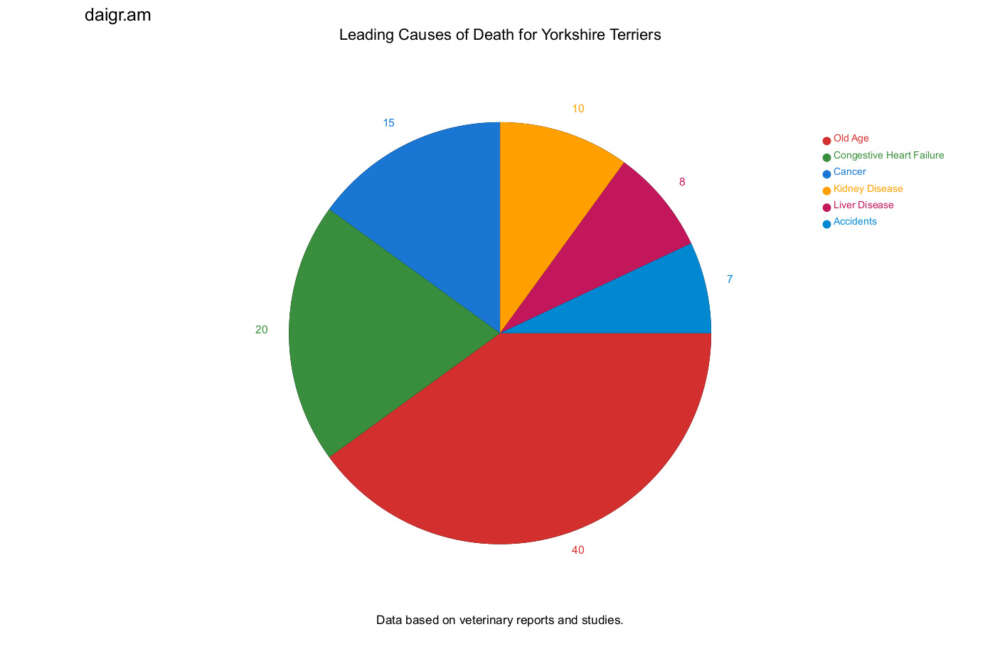What Is the Lifespan of a Yorkie? Here’s the answer:
A Yorkie’s life span is between 12 to 15 years, with an average age of about 13.5 years. Male Yorkies live – typically – 1.5 years less than females. Although this is not regarded as an exceedingly long life span, it’s somewhat lengthier in the period domesticated dogs generally live, which happens to be 11.08 in the UK and 12.67 in the US.
It must be mentioned that the number of 12.67 yrs is death through normal causes. Whenever loss of life by injury along with other means is considered the age falls to 11.1 yrs.
Key Takeaways
| Aspect | Recommendation |
|---|---|
| Yorkie Lifespan | Average of 13.5 years; regular vet checkups can help in early detection of potential issues. |
| Leading Causes of Death | Be vigilant about infections, injuries, respiratory diseases, and congenital conditions like liver shunts. |
| Preventive Measures | Adhere to vaccination schedules, spay/neuter, maintain a balanced diet, and ensure regular exercise. |
| Recognizing Aging Signs | Adjust care routine as Yorkies age, with attention to diet, exercise, and comfort. |
There are two explanations why this breed of dog has a life span that’s more than the nation’s average:
- Small dog breeds live more than medium to large breeds
- The Yorkie is a somewhat healthy breed of dog. Nearly all health concerns that Yorkies deal with aren’t lethal.
Within this area, we will address the following:
- The critical reasons for death with the Yorkie breed
- Specific actions that you could decide to try to assist your Yorkie reach their optimum life span
Yorkshire Terrier Leading Causes of Death

The chart above provides a detailed look at the leading causes of death for Yorkshire Terriers, based on veterinary reports and studies. Here’s a breakdown of the data:
- Old Age: 40%
- Congestive Heart Failure: 20%
- Cancer: 15%
- Kidney Disease: 10%
- Liver Disease: 8%
- Accidents: 7%
In-Depth Analysis and Insights
- Old Age: It’s heartening to see that a significant percentage of Yorkshire Terriers live to an old age. This speaks volumes about the quality of care they often receive.
- Congestive Heart Failure: This is a common issue in small dog breeds, and Yorkshire Terriers are no exception. Regular veterinary check-ups can help in early diagnosis and management.
- Cancer: While not as prevalent as in some other breeds, cancer still poses a significant risk. Early detection is key, so regular vet visits and screenings are advised.
- Kidney and Liver Disease: These conditions are often related to diet and can be managed or even prevented with proper nutrition and regular veterinary care.
- Accidents: A smaller but still significant cause of death. This highlights the importance of a safe environment for these small and often curious dogs.
Instrumental analysis was carried out from the University of Georgia, which continued for more than 20 years to document the most notable reasons for loss of life in dogs.
They recorded 82 pedigreed dogs together with half breeds. There was 74,556 dogs in total and in this particular research group hundreds of were from the Yorkie breed.
Their objective in this Twenty year analysis was to discover mortality models that will result in much better health-maintenance methods that could permit pet dogs to live lengthier lives.
The results provide an excellent comprehension of what Yorkies die of, and remarkably, a few reasons for death are avoidable.
Outcomes are split intotwo2 groups: Pups – dogs younger than one-year-old and Mature dogs, 12 months and more.
The Main Leading Causes of Death for Yorkie Pups
With Yorkie pups – those younger than 12 months the two main reasons for death are:
1) An infection – Regrettably, the disease is the most notable reason for death observed in Yorkie puppies.
For example:
Parvovirus – This is referred to as ‘Parvo’, and it’s also a frightening ailment that strikes the intestinal tract and body’s defence mechanism of a pup. When this occurs, extreme nausea or vomiting and looseness of the bowels may rapidly trigger lethal dehydration. It’s infectious for just about any Yorkie who isn’t correctly immunized.
Several puppies get this within a ‘window of vulnerability’ when antibodies from the mother’s milk have decreased off however the vaccine couldn’t yet provide a suitable defence.
This particular virus lives on afflicted dogs as well as in the fecal material from these dogs; it may quickly travel amongst many dogs within a kennel. Maintaining pups immunized on a tight schedule and using correct washing techniques to every area of a kennel are essential to prevent the spread of Parvo.
Distemper – There exists a vaccine for this lethal condition too. It is a highly infectious disease of the respiratory and intestinal systems. First symptoms are weakness and coughing. It advances into rounds of diarrhea which deplete a canine of hydration and electrolytes. The deadly stage takes place when it advances towards the spinal-cord and brain of the dog.
– There exists a vaccine for this lethal condition too. It is a highly infectious disease of the respiratory and intestinal systems. First symptoms are weakness and coughing. It advances into rounds of diarrhea which deplete a canine of hydration and electrolytes. The deadly stage takes place when it advances towards the spinal-cord and brain of the dog.
Staying persistent with vaccine shots and keeping the puppy indoors until the all the puppy shots are finished can stop a pup from contracting this deadly illness.
 Leptospirosis – Regardless of this as a dangerous dog disease, in many places the inoculation with this is not enforced. Whilst there are lots of types of Leptospirosis, the deadly strain leads to kidney and liver damage. It is caught through the contaminated urine from wild life. Because of this, only pets considered in danger will get the vaccine. This will include any Yorkies living on residence that is near wildlife environments. Wildlife consists of little forest animals for example raccoons and squirrels.
Leptospirosis – Regardless of this as a dangerous dog disease, in many places the inoculation with this is not enforced. Whilst there are lots of types of Leptospirosis, the deadly strain leads to kidney and liver damage. It is caught through the contaminated urine from wild life. Because of this, only pets considered in danger will get the vaccine. This will include any Yorkies living on residence that is near wildlife environments. Wildlife consists of little forest animals for example raccoons and squirrels.
2) Injury – This can also be a leading factor for death for mature Yorkies. Most cases of injury are avoidable – see beneath for specifics.
The Top Four Causes Of Death for Yorkies
For all 12 months and older, the most notable reasons for death are:
1) Breathing disease – 16% of Yorkies passed away because of breathing disease. Justtwo2 dog breeds die from this at a greater rate than a Yorkie: the Borzoi (16%) and the Bulldog (18%).
Types of breathing sickness which was lethal for this breed of dog include:
• Collapsed trachea
• Brachycephalic syndrome
• Pulmonary fibrosis
With older dogs, progressive degenerative transformations that affect regular breathing may cause the lungs to become more susceptible to air-borne toxins and pathogens.
Please note the tracheal collapse shows up here and isn’t unusual with small dog breeds. For many, it is usually deadly whenever mild to serious instances result in persistent bronchitis and other problems. Among the reasons for this is problems with the neck due to lead being linked to a dog collar. This is one good reason why it is usually suggested to walk your Yorkie whilst they wear a dog harness.
2) Cancer – +/- 11% of Yorkies give in to cancers. Despite the fact that cancer isn’t even one of the main reasons for death for a lot of small dog breeds (The Chihuahua is just +/- 7.3 % while the Pekingese is just +/- 7.6%), it’s the Second cause of death for any Yorkie.
A Yorkie’s lifespan could be reduced because of a selection of cancers such as lymphoma (a cancer in the lymph nodes), skin cancer, mammary gland cancers, soft tissue sarcomas (these take place outside the body and inside organs, they then gradually develop and spread in the liver and lungs) and lastly cancer in the bones.
It is essential to observe that 50% of cancer is treatable if found early understanding that the chance of producing mammary cancer may be lowered significantly if your female Yorkie is spayed. Consequently, regarding this cause of death certain cases are possible to avoid.
3) Trauma – This is the next major cause of fatality for Yorkie puppies and the third leading cause of death for older Yorkies. An awful +/-10.5% of Yorkies die because of injury, plus in nearly every situation, this cause of death could be avoided.
Nearly 11% of Yorkies perishing because of injury is a number that dog owners ought to be conscious about. Loss of life by injury included lethal trauma to the body, head or both.
This consisted of totally avertable trauma such as:
-
- Stepped on
- Tripping over
- knocked accidentally down a staircase
- dropped by accident
- Run down by a car
- Lethal trauma received while driving in a car
Basically from the list above, these causes of death equally for Yorkie adult dogs and puppies could be avoided. The typical lifespan for this breed of dog might improve drastically if lethal trauma were removed from the situation.
4) Genetic Disease- Along with +/-10% of Yorkies succumbing to a congenital condition, this is actually the fourth major reason for death for Yorkies 12 months and older. This class consists of just about all disease and types of conditions which are found at birth. Particularly are liver shunts that the Yorkie is vulnerable to. This can be known as PPS (portosystemic shunt).
In the united states, Yorkies possess a Thirty six time higher possibility of getting liver shunts than other pedigreed dogs combined.
With this particular and occasionally fatal ailment, there isn’t sufficient blood circulation to the liver. You will find different levels that the circulatory can be ‘shunted’.
Whilst pups are born with this problem, the dog might not reveal any symptoms before the age of one years or perhaps a tad older. Signs or symptoms consist of:
- Weakness
- Poor growth rates
- Throwing up
- Bowel problems
- Looseness of the bowels
- Increased thirst
- Excessive drooling
- Behavioral changes (Gazing, systematically rotating in circles)
- Increased peeing
- Convulsions
With lots of Yorkies, medical symptoms show up One to three hrs after consuming meals as harmful toxins, usually blocked with a good liver, get to the dog’s brain instead.
It’s clinically determined via dye studies, x-rays, blood testing and ultrasound examination to examine blood ammonia concentration.
Remedy for small cases involved an alteration towards the diet plan (reduced protein) and medicines such as lactulose, neomycin or metronidazole to help avoid the accumulation of toxins that grow as a result of damaged liver. Regrettably, while a few dogs may live with this problem while being on non-invasive treatments, lifespan is drastically reduced.
As this is such a risk towards the life span of the Yorkie, mild to extreme instances are cured with surgery. More than 50% of pets which have shunts extreme enough to result in medical symptoms and adjustments to conduct will perish in a single year without the surgical treatment.
Yorkie Liver Shunt Symptoms (Warning Graphic Content!)
For bigger dog breeds, the shunt is completely shut off; though small breeds – especially the Yorkie- an alternative approach to partly shutting the shunt or utilizing constrictor bands that delicately close during a period of Five weeks encounters much better outcomes.
The actual rate of survival after surgical treatment is a remarkable 95.1%. Subsequently 33.3% of Yorkies will have some blood circulation problems although only roughly 15% will demonstrate medical symptoms.
Increasing the life span of your Yorkie
There are numerous things that you’re able to do to aid your Yorkie to live longer. Proper care, which you provide from their 1st day, through their adult years and into the later years, has a good influence on your pet’s life span and health.
1) Inoculations – With a disease leading to the death of Yorkie pups and a worry for more mature dogs, maintaining injections is also essential. Pups shouldn’t be taken outdoors past the boundaries of the home’s residence till 14 days when puppy vaccinations have been supplied. If other pets enter the backyard, the puppy needs to be monitored and never permitted to smell the faeces or urine of some other animals or pets.
Confer with your veterinarian concerning the probable requirement for Leptospirosis if you reside in a high-risk region.
2) Avoiding Injury – With injury remaining such a significant cause of death for a lot of Yorkies (Second primary reason for pups and Third major cause- 10.4%- for all those more than 12 months), consideration should be placed on making a risk-free habitat for this breed of dog.
– Everybody in the home and anyone visiting should be acutely conscious that this is an ‘under-the-foot’ pet. Consideration should be put on the understanding that this particular small dog breed can discreetly show up beneath your feet unexpectedly. Family members must always glance before walking, be mindful whenever walking waymark rooms, check before they take a step backwards and try to check before sitting on the sofa. Whenever a Yorkie rests, this ought to be in a risk-free, protected spot to ensure that if anyone wakes up during the night, the puppy can’t be beneath their feet.
– Getting dropped and obtaining lethal injuries is a sad death fact, yet this breed of dog will occur frequently. This may happen if a kid isn’t educated with correct handling skills or the owner attempts to multi-task while Yorkie wiggles from their arms. Any Yorkie may be injured by being thrown about or bounced free from both hands. Proper care should be taken to pick up and support a Yorkie safely. When holding this pet, all considerations must be centred on this with no distractions.
– Never when outdoors should a Yorkie be off a lead unless, of course, within a secure, encapsulated backyard. The most excellent chance of getting off a leader is getting struck by a vehicle while running out into the road, as injury via car impact is probably the leading cause of death.
– In no way leave your pup or pet outdoors alone, whether or not the backyard is confined, because this Yorkie is very effective at digging underneath a fence or locating a vulnerable area. Unspayed Yorkies and unneutered males incline to escape more frequently.
– Be cautious whenever you or other people open a door; a free-roaming Yorkie can sneak out to the street within the flash. If your Yorkshire Terrier tends to go for the doorway as soon as the door opens, it can benefit from possessing a rule to have everyone knock first – even when the door is unlatched – to permit anyone to hold your pet to stop them from running out.
– Train your Yorkie basic instructions such as “Come” and “sit”. If the Yorkie encounters one of such instructions is yelled authoritatively, it might save their life!
3) Supply appropriate dental hygiene. Whenever a tooth gets infected, and there’s tooth decay within the mouth area, an infection can go into the body, accessing the cardiovascular system or brain. Pets with corroded teeth endure pain, which usually stresses your whole body, and more mature, senior Yorkies with absent teeth find it difficult to eat. For many of these reasons, correct teeth cleansing is crucial and is an action that you can use to boost the life expectancy of one’s Yorkie.
A four- to five-minute scrubbing and annual expert examinations will keep a Yorkie’s teeth excellent and healthy. Use a high-quality paste and boost this with dental care snacks that encourage excellent dental hygiene.
4) Spay/neuter – Equally for females and males, even though there are some contradictory reports, most veterinarians concur that spaying/neutering increases lifespan. Boy Yorkies who are neutered before six months live about 20% more than their unfixed Yorkies. On average, females who are spayed before the chronological age of 6 months (it must be carried out before their initial cycle) live 25% longer.
When a Yorkie is spayed correctly, it reduces the chances of getting ovarian cancer. This kind of dog cancer is deadly in nearly 50% of instances. Spaying also decreases the perils of mammary cancer. Neutering eradicates the likelihood of having testicular cancers (whenever completed before the 180-day mark) and reduces the chances of getting cancer in the prostate.
5) Keep them on a nutritious diet – What your pet consumes daily, week after week, and every year greatly influences their general health and, for that reason, lifespan. Only give top-quality commercial food or homemade meals. Steer clear of colourful made doggie snacks. Use a filtration device in your kitchen tap to prevent offering straight regular water for your pet. Ensure that your pup meets the water needs to remain appropriately hydrated.
6) Be persistent regarding exercise- Along with a healthy diet plan, frequent exercise during your Yorkie’s lifespan will prolong their lifetime. It will keep their cardiovascular system healthy and muscles toned and play a role in the mental well-being of any dog.
Numerous owners do well throughout the summer and spring; nonetheless, exercises are generally cut back within the more extraordinary fall and winter periods. Let your Yorkie get the advantages of activity throughout the year is essential. When you can take one day off throughout the cold days, if you appropriately clothe your Yorkie, your pet will do fine in the cold if maintained to twenty minutes two times daily.
7) Do not hold off on Veterinarian visits – Numerous serious problems can be remedied quickly. This is especially applicable regarding equal cancer and liver shunts.
Make sure you plan for unpredicted health problems; it is a great pity whenever owners hesitate to take their pet to the vet because of the financial stress of a consultation. The cost should be included in an owner’s month-to-month expense plan. You may even consider insurance for your pet, although nearly all will not pay for genetic disorders and pre-existing problems.
Many different plans do address: bacterial infections, allergies, eye problems, stomach ailments, arthritis, ulcers, skin problems such as cancer of the skin, nail issues, thyroid conditions, abrasions, kidney disease, trauma care, tooth removal, lung problems, diabetic issues and much more.
In essence, if you have to ponder whether your dog must visit a veterinarian, most likely, they do. Finding problems quickly is essential for good recovery, and obtaining treatment can halt minor issues from changing into more significant, more severe problems that could be deadly.
8) Acknowledge your dog’s age. Time passes fast, and many owners don’t want to accept that their Yorkie is starting to become elderly and is in its final phase. Nonetheless, being acutely conscious of this breed’s average life span and creating adjustments to look after as their Yorkie grows older will help with the standard of living.
Elderly Yorkies ought to be given appropriate orthopaedic mattresses for age-related joint disease. Physical exercise and meals should be modified. Dietary supplements for their fur and much more concentrated grooming methods can sort out issues of getting older, for example, dry skin and coat. Mature Yorkies are often seen by their vet two times each year instead of once for regular examinations.
When is it time to put your Yorkie down?
Regrettably, nearly all pet owners will have to make the sad decision to end their suffering pet’s life. Just about 25.1% of dogs pass away from natural causes while asleep. With the leftover 75% of pets, owners will have to make the tough decision to permit their pets to be put to sleep to end their pain.
In this case, it’s not dependent on if but on when. This is a significant personal issue that will unquestionably weigh on the souls of people who need to decide if assistance is ideal for their pets. Numerous owners question when you must let a pet dog die and how you realize if your pet would like to be put to sleep. They are challenging concerns.
At times such as this, you must consider the pet’s standard of living. If your Yorkie is having trouble breathing or perhaps is in near continuous discomfort, and all sorts of procedures of remedy have already been tried, it is almost always within the welfare of the pet to permit them to retreat to a much better place. Most often, owners will need to take on the suffering of loss to offer the gift of pain alleviation.
Final Thoughts
Discussing the lifespan of Yorkshire Terriers involves more than just genetics. It’s crucial to consider factors like yorkie dental care, which can significantly impact their overall health and longevity. Additionally, selecting the right yorkie collars ensures comfort and safety during walks. Understanding Affenpinscher vs Yorkshire Terrier comparisons can also provide insights into breed-specific health considerations.
Frequently Asked Questions
How can I extend my Yorkie’s lifespan?
Regular vet check-ups, a balanced diet, exercise, and preventive healthcare measures can contribute to a longer, healthier life.
What are the common health issues in Yorkies?
Common issues include dental problems, liver shunts, respiratory diseases, and susceptibility to infections and injuries.
How can I keep my Yorkie safe from injuries?
Always have your Yorkie on a leash outdoors, be cautious when moving around them to prevent accidents, and educate others in your household to do the same.
What signs indicate aging in Yorkies?
Signs include decreased activity, joint stiffness, dental issues, and changes in coat condition.
When should I consider euthanasia for my Yorkie?
When their quality of life deteriorates significantly due to chronic pain or severe health issues, consult with your vet for a compassionate decision.

As a lifelong dog lover, I fell in love with Yorkies for their spunky personalities, intelligence, and unwavering loyalty.
As a dedicated Yorkie owner, I have spent years learning about the breed and how to provide the best possible care for them. From finding the proper diet to exercise, and so much more! I take every aspect of my Yorkie’s life seriously.
In addition to being a loving dog parent, I’m an avid blogger, sharing my experiences and insights on all things Yorkie-related. From training tips to grooming advice, Yorkieclothing.com is a go-to resource for other Yorkie owners worldwide.




